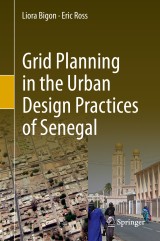Details

Grid Planning in the Urban Design Practices of Senegal
|
CHF 118.00 |
|
| Verlag: | Springer |
| Format: | |
| Veröffentl.: | 01.01.2020 |
| ISBN/EAN: | 9783030295264 |
| Sprache: | englisch |
Dieses eBook enthält ein Wasserzeichen.
Beschreibungen
<p>This book is the first to trace the genealogy of an indigenous grid-pattern settlement design practice in Africa, and more specifically in Senegal. It does so by analyzing how the precolonial grid-plan design tradition of this country has become entangled with French colonial urban grid-planning, and with present-day, hybrid, planning cultures. By thus, it transcends the classic precolonial-colonial-postcolonial metahistorical divides.</p><p>This properly illustrated book consists of five chapters, including an introductory chapter (historiography, theory and context) and a concluding chapter. The chapters’ text has both a chronological and thematic rationale, aimed at enhancing Islamic Studies by situating sub-Saharan Africa’s urbanism within mainstream research on the Muslim World; and at contributing directly to the wider project of de-Eurocentrizing urban planning history by developing a more inclusive, truly global, urban history.</p>
Preface.- List of Figures.- Bibliography.- Chapter 1. Grid Plan Cultures, Historiographic Traditions and Africa.- Chapter 2. Grid Plan Traditions in Senegal: Contemporary Muslim Towns and their Historical Formalistic Origins.- Chapter 3. Configuring the French Colonial Grid in Senegal: Comptoirs, Escales, Villages de Liberté and Capital Cities.- Chapter 4. Current Planning Interactions: What Is Going On Beneath the Grids of Senegal’s Cities Today [in collaboration with Tom Hart*].- Chapter 5. Conclusion: Disentangling the Grid.- Index.<div><br></div><div><br></div><div><br></div>
<p><b>Liora Bigon</b> is a Senior Lecturer in the Department of Multidisciplinary Studies at HIT‒ Holon Institute of Technology, where she teaches (post-)colonial, urban and Islamic histories. She holds a PhD from the University of Manchester in architectural history and has written extensively on sub-Saharan Africa urban cultures, including: Garden Cities and Colonial Planning: Transnationality and Urban Ideas in Africa and Palestine (Manchester University Press, 2014, edited with Yossi Katz); French Colonial Dakar: The Morphogenesis of an African Regional Capital (Manchester University Press, 2016); Place Names in Africa: Colonial Urban Legacies, Entangled Histories (Springer, 2014, edited); and Gridded Worlds: An Urban Anthology (Springer, 2018, edited with Reuben Rose-Redwood). </p><p><br></p><p><b>Eric Ross</b> is a Professor of Geography at Al Akhawayn University in Ifrane, Morocco, where he has been teaching since 1998. He holds a PhD in Islamic Studies from McGill University. He is an urban and cultural geographer whose research focuses on Muslim Africa. Ross has conducted research on Sufism and urbanization in Senegal as well as on cultural heritage and development in Morocco. He is the author of Sufi City: Urban Design and Archetypes in Touba (University of Rochester Press, 2008); and first author of Assessing Tourism in Essaouira (Al Akhawayn University Press, 2002). In addition, Ross has published articles for academic journals such as Urban Studies and Planning Perspectives, has authored chapters in eleven edited volumes, and has written entries for specialized encyclopedias including the Wiley-Blackwell Encyclopedia of Urban and Regional Studies and Oxford Research Encyclopedia of African History.</p>
<p>Grid Planning in the Urban Design Practices of Senegal</p><p><br></p><p>This book explores the entanglement of African and Western cultures of grid planning in urban Senegal from pre-colonial times up to the present. The most important and significant urban centers of historic Senegambia and modern Senegal, a mostly Muslim country of West Africa, are examined. What is revealed is a continuous deployment of grid planning in the configuration of towns, villages, neighborhoods and cities since the sixteenth century. Both endogenous African and exogenous colonial traditions of grid planning have been used, simultaneously but often quite separately, to lay out settlements. The indigenous Senegambia grid plan first characterized elite pre-colonial settlements, such as royal capitals and centers of Islamic instruction, before it was popularized and mass-produced by Senegal’s mystical Sufi orders during the colonial era. This autochthonous tradition culminated in the mid-twentieth century design of the great shrine city of Touba. The French grid plan, for its part, characterized nearly every type of colonial settlement, from mercantilist ports like Saint Louis to the prestigious colonial spaces of Dakar, capital of a French empire in Africa, to enumerable peanut marketing rail-towns (escales). Though the two grid-planning traditions were initially quite distinct in origin and symbolic significance – royal prerogative, Islamic propriety or efficient exploitation of the land and control of its people – they have become inextricably entangled with each other over the course of history. This book explores this entanglement in order to: (a) create a truly global urban history to replace the otherwise Eurocentric meta-narrative of urban planning and design; (b) enhance Islamic Studies by situating sub-Saharan Africa’s urbanism within mainstream research on the Muslim World; (c) shift the discussion from a determinist genealogy of vernacular versus Western urban patterns towards a more dialectic, entangled and processual approach to the production of space; and (d) highlight the role of African agents in shaping the continent’s cities, even at the height of formal colonialism. <br></p><p><br></p><p>The book is primarily intended for scholars engaged in the fields of urban history, architectural and urban planning history, world history, African studies, Islamic studies, urban geography, cultural studies and art history. <br></p><div><br></div>
Offers a unique focus on urban grid-plans in Africa and the global South Provides an in-depth study supported by rich visual images First book framing Senegalese grid-plans and historiographic traditions
<div><br></div><div><br></div>
Diese Produkte könnten Sie auch interessieren:

The Last Samurai - Japanische Geschichtsdarstellung im populären Kinofilm

von: Daniel Scherrer

CHF 54.99

Harz-Zeitschrift für den Harz-Verein für Geschichte und Altertumskunde

von: Harzverein für Geschichte und Altertumskunde e.V.

CHF 17.00














